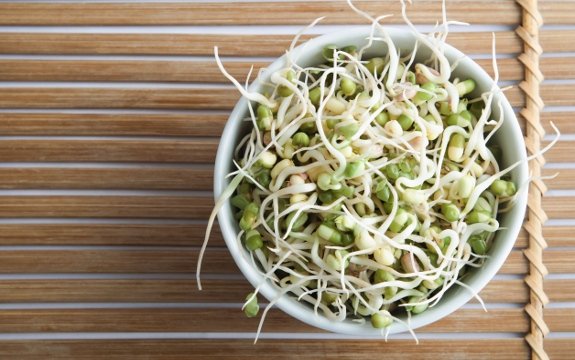Mung Bean Sprouts can Drastically Reduce Cancerous Tumors

 Sprouts have been heralded for their incredible nutrition and medicinal benefits for a very long time, and now it looks as though one of the staple foods of many far eastern cultures and India is another cancerous tumor inhibitor. Mung bean sprouts also improve endurance, and enhance all three doshas (body types), according to Ayurvedic medicine. Is there anything this little wonder can’t do?
Sprouts have been heralded for their incredible nutrition and medicinal benefits for a very long time, and now it looks as though one of the staple foods of many far eastern cultures and India is another cancerous tumor inhibitor. Mung bean sprouts also improve endurance, and enhance all three doshas (body types), according to Ayurvedic medicine. Is there anything this little wonder can’t do?
A Nurse Health study shows that eating sprouted mung beans as well as other legumes can reduce the chances of getting colon cancers and protects the bowels. For the elderly, eating just 20 grams daily of mung beans or other nutritious legumes can reduce death rates by 8%, and people of all ages can enjoy better heart health, with a 22% lower cardiac arrest rate from eating fiber-rich foods.
So why sprout your beans? Once you start the germination process, the anti-nutrients in plants melt away and the life-giving properties – vitamins, minerals, phytonutrients etc., expand like a star being born. You are eating a tiny little plant when you eat a sprout – and when it is most dense in nutrition in perhaps its entire life cycle.
Sprouting can actually yield up to 800% more nutrition than fully grown vegetables. Just three-day germinated broccoli sprouts can contain 50 times the amount of phytonutrients as eating a mature broccoli spear.
Here are 6 steps to growing your own sprouts for better nutrition.
When you sprout:
- 1. You reduce phytic acid – which binds to important minerals your body needs, and that are readily available in the sprouted plant, not the seed. You more readily absorb iron, magnesium, copper, calcium, and zinc when you eat sprouts.
- 2. You make amino acids form proteins. The soaking part of sprouting which allows the seed to break out from its shell or outer coating actually helps to turn some hard-to-digest protein into amino acids. Because of this, you can greatly reduce intestinal gas or bloating that comes from eating beans when they haven’t been sprouted.
- 3. Sprouting increases vitamin B content in beans, especially B2, B5, and B6, sometimes up to 800%!
Whether you enjoy a mung bean dal, a famous Indian dish, mung bean curries, or mung bean paste as used frequently in Chinese delicacies, sprouting your beans will make sure that you get the most benefit from this amazing legume.

I like to make these for a salad, and not use any lettuce, turns out great !!